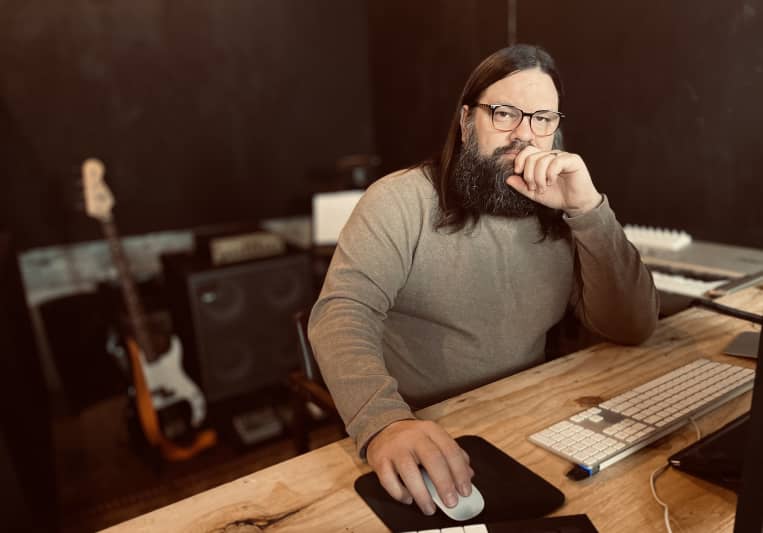
Versatile electric and double bassist with mad Pro Tools chops to boot. Also proficient in Ableton, Logic, and Cubase.
Professional musician, music director, and engineer. With just shy of 30 years slingin' low notes, I've recorded and performed with rock, country, hip hop, jazz, and classical artists/ensembles. I'm comfortable in any style and love to stretch myself as a musician. So, whatever you got and whatever your vision, I'd love to partner with you and make it happen. We can work together to get the perfect tone, vibe, and bass line for your song(s).
Here is what to expect if we work together:
After you send me an mp3 of your song(s) and we talk about what you need (electric, upright, or synth bass, general direction, and notes), I will pull it into Pro Tools and record it.
For electric bass tracks, I typically record on either a Fender P-Bass or Warrior 6 string depending on what the track needs. Electrics are tracked simultaneously through two preamps, an Ampeg and an Aguilar. For upright, I track on a 1960 Kay bass with David Gage Realist (under-the-bridge) transducer. The upright is miked with a Royer R-10 as well as recorded through the Ampeg and Aguilar preamps. This gives you tons of flexibility to blend the bass tracks together and I find that most studios and producers I work with really appreciate it.
Normal turnaround would be two - three days. In the event we need revisions, normal turnaround is 24 hours. This, of course, can be effected by time zone difference.
Tell me about your project and how I can help, through the 'Contact' button above.
Credits
Interview with Christopher Hodges
Q: Analog or digital and why?
A: There's beauty in both. Some music sounds better with the warmth and harmonic distortion but some is better off with the crispness of digital reproduction. Plus, what I like analog, others think would sound better digital. It's in the ear of the beholder.
Q: What's your 'promise' to your clients?
A: To serve your project and honor your vision and efforts.
Q: What do you like most about your job?
A: Are you kidding? I make music for a living. AND, I get to collaborate with amazing people.
Q: What's the biggest misconception about what you do?
A: That you want or need to be famous to make a living doing music.
Q: What advice do you have for a customer looking to hire a provider like you?
A: Your project is special to you. Even if you haven't had it in your hands for very long, it will someday bear your stamp. Make sure whoever works on it has your vision in mind and honors that as they add to it.
Q: What was your career path? How long have you been doing this?
A: I started performing on bass and vocals in my early teens. A couple years later, I got hooked on jazz and the big band arrangements that Jaco Pastorious had kicked out. I fell down the jazz rabbit hole fast and hard so I practiced and studied music theory constantly until I ended up in college studying music and performing in the school jazz ensembles. I maintained my own ensembles as well, performing original material at concerts and festivals a long with standards and covers for private events. Even releasing a couple of albums along the way. I also stayed active in rock, pop, hip hop, country, and other genres through work as a freelance and session bassist. By the time I left university, I had become more and more interested in live events and modern concert production. So, I took my knowledge of performing and studio recording and jumped into the live side of life - becoming proficient in audio and playback, lighting design, scenic design, rigging, producing, etc. Almost a decade into that and I started to notice I really missed the studio. So, I began to pivot my workload to allow me more time to work on session work, composing, producing, and mixing. Soon after the pivot, I started my own label and production company focusing on helping artists and composers get what they need to make their projects see daylight.
Q: What do you bring to a song?
A: I hope I bring what the song needs; not what I want to show off about my tone or chops.
Q: What's your typical work process?
A: I need to wrap my head around a project before I start on it so I begin with a 30,000 ft view and dig down to the details as I get ready to work. For instance, If I'm tracking an instrument, I listen to the song all the way through then again as I mark the different sections and note any runs or hits that I want/need to follow or duplicate. Then, it's all about figuring out the harmonic progressions and how I want to handle them.

I was the Bassist in this production
- Bass ElectricAverage price - $125 per song
- Bass UprightAverage price - $125 per song
- Mixing EngineerAverage price - $200 per song
For bass, mixing, and editing projects: 1-5 day turn-around time with up to two free revisions (after which a small fee per revision will be added).
Multiple-track projects get a discounted per song rate.



